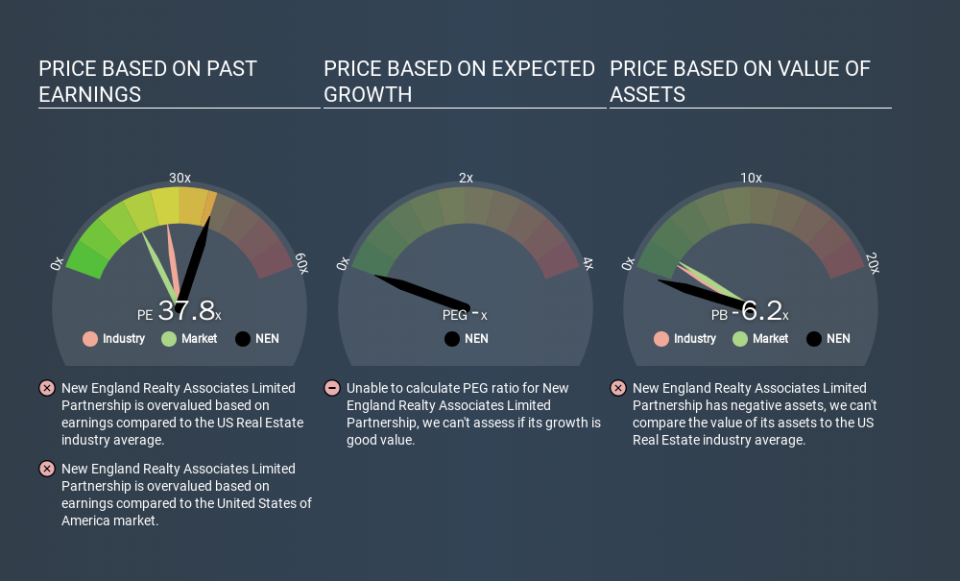Here's How P/E Ratios Can Help Us Understand New England Realty Associates Limited Partnership (NYSEMKT:NEN)

New England Realty Associates Limited Partnership (NYSEMKT:NEN) shares have retraced a considerable in the last month. But plenty of shareholders will still be smiling, given that the stock is up 11% over the last quarter. The stock has been solid, longer term, gaining 21% in the last year.
All else being equal, a sharp share price increase should make a stock less attractive to potential investors. In the long term, share prices tend to follow earnings per share, but in the short term prices bounce around in response to short term factors (which are not always obvious). So some would prefer to hold off buying when there is a lot of optimism towards a stock. Perhaps the simplest way to get a read on investors' expectations of a business is to look at its Price to Earnings Ratio (PE Ratio). A high P/E implies that investors have high expectations of what a company can achieve compared to a company with a low P/E ratio.
Check out our latest analysis for New England Realty Associates Limited Partnership
How Does New England Realty Associates Limited Partnership's P/E Ratio Compare To Its Peers?
We can tell from its P/E ratio of 37.80 that there is some investor optimism about New England Realty Associates Limited Partnership. You can see in the image below that the average P/E (26.5) for companies in the real estate industry is lower than New England Realty Associates Limited Partnership's P/E.
That means that the market expects New England Realty Associates Limited Partnership will outperform other companies in its industry. Clearly the market expects growth, but it isn't guaranteed. So further research is always essential. I often monitor director buying and selling.
How Growth Rates Impact P/E Ratios
P/E ratios primarily reflect market expectations around earnings growth rates. When earnings grow, the 'E' increases, over time. That means unless the share price increases, the P/E will reduce in a few years. Then, a lower P/E should attract more buyers, pushing the share price up.
Notably, New England Realty Associates Limited Partnership grew EPS by a whopping 47% in the last year. And its annual EPS growth rate over 5 years is 54%. With that performance, I would expect it to have an above average P/E ratio.
A Limitation: P/E Ratios Ignore Debt and Cash In The Bank
Don't forget that the P/E ratio considers market capitalization. Thus, the metric does not reflect cash or debt held by the company. Theoretically, a business can improve its earnings (and produce a lower P/E in the future) by investing in growth. That means taking on debt (or spending its cash).
Such expenditure might be good or bad, in the long term, but the point here is that the balance sheet is not reflected by this ratio.
Is Debt Impacting New England Realty Associates Limited Partnership's P/E?
New England Realty Associates Limited Partnership's net debt is considerable, at 102% of its market cap. This level of debt justifies a relatively low P/E, so remain cognizant of the debt, if you're comparing it to other stocks.
The Bottom Line On New England Realty Associates Limited Partnership's P/E Ratio
New England Realty Associates Limited Partnership's P/E is 37.8 which is above average (18.9) in its market. While its debt levels are rather high, at least its EPS is growing quickly. So it seems likely the market is overlooking the debt because of the fast earnings growth. What can be absolutely certain is that the market has become less optimistic about New England Realty Associates Limited Partnership over the last month, with the P/E ratio falling from 37.8 back then to 37.8 today. For those who prefer to invest with the flow of momentum, that might be a bad sign, but for a contrarian, it may signal opportunity.
Investors should be looking to buy stocks that the market is wrong about. People often underestimate remarkable growth -- so investors can make money when fast growth is not fully appreciated. Although we don't have analyst forecasts you might want to assess this data-rich visualization of earnings, revenue and cash flow.
Of course, you might find a fantastic investment by looking at a few good candidates. So take a peek at this free list of companies with modest (or no) debt, trading on a P/E below 20.
If you spot an error that warrants correction, please contact the editor at editorial-team@simplywallst.com. This article by Simply Wall St is general in nature. It does not constitute a recommendation to buy or sell any stock, and does not take account of your objectives, or your financial situation. Simply Wall St has no position in the stocks mentioned.
We aim to bring you long-term focused research analysis driven by fundamental data. Note that our analysis may not factor in the latest price-sensitive company announcements or qualitative material. Thank you for reading.

